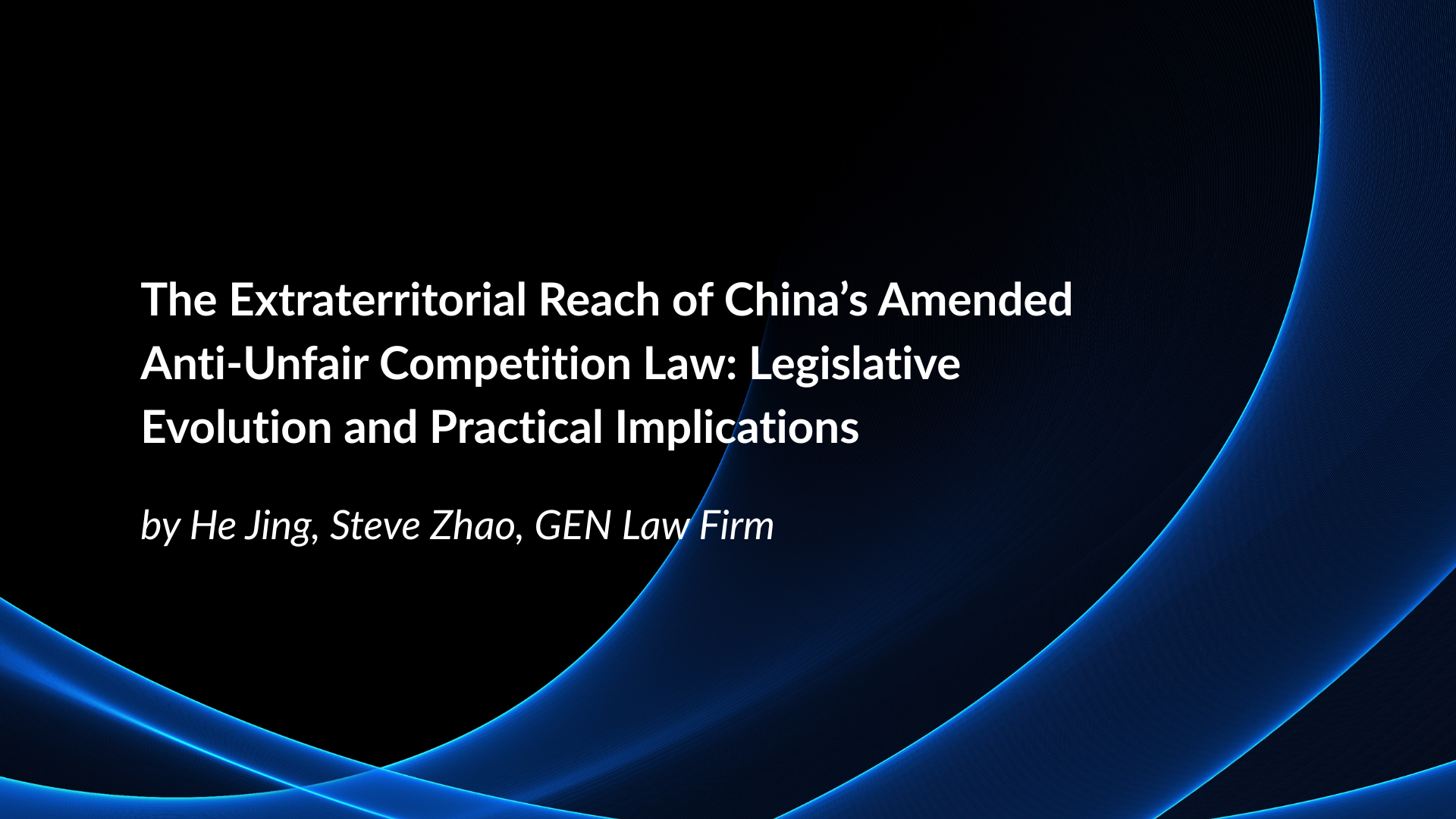by He Jing, Steve Zhao, GEN Law Firm
*The views expressed in externally authored materials linked or published on this site do not necessarily reflect the views of LexisNexis Legal & Professional.
The 2025 amendments to China's Anti-Unfair Competition Law (AUCL) represent a significant development in the country's competition regulation framework. To a large extent, the new amendments resemble pricing regulations or antitrust laws. Many of the influential provisions target online platforms and large enterprises. For example, under the new laws, platform operators shall not force or disguisedly force vendors to sell goods at prices below cost; large enterprises with “superior positions” in capital, technology, transaction channels, industry influence shall not require small and medium-sized enterprises to accept obviously unreasonable business terms, or to delay payments. The background is that the government placed priority on finding ways to stop the brutal pricing competition.
What may be more meaningful for the international legal community is probably its Article 40's extraterritorial jurisdiction clause. Under this new rule, any unfair competition act as defined in the amended law that is carried out outside China shall be dealt with under the AUCL. It is widely held that China now officially introduces “long arm jurisdiction” into its unfair competition law. We therefore prepare this analysis to examine more closely the legislative context and the net implications of the extraterritorial application of AUCL.
A. The Development of Extraterritorial Jurisdiction in Chinese Law
China's journey toward establishing extraterritorial jurisdiction in commercial laws has been gradual yet deliberate. The foundation was laid by the Anti-Monopoly Law in 2008, which first asserted jurisdiction over overseas conduct affecting domestic markets. This approach was subsequently expanded through various sector-specific laws, including those governing data security and personal information protection.
No such extraterritorial application of its Anti-Unfair Competition Law existed until the Supreme People's Court enacted its 2022 Judicial Interpretation on the Application of the Anti-Unfair Competition Law. Article 27 of this interpretation explicitly established that Chinese courts could exercise jurisdiction over unfair competition acts occurring outside China if the injurious consequences manifested within Chinese territory. This principle of "effects-based jurisdiction" is now codified in Article 40 of the AUCL.
While the 2022 Supreme Court interpretation focused on judicial jurisdiction, the amended Article 40 extends to administrative enforcement, granting market regulators authority over cross-border unfair competition matters. This legislative development reflects China's growing confidence in asserting regulatory authority in an increasingly interconnected global economy.
B. Policy Rationales and Legislative Intent
The expansion of extraterritorial jurisdiction through Article 40 serves multiple policy objectives. We believe that the primary motivation is to address the challenges posed by digital globalization, where unfair competitive practices often transcend national borders. On very basic levels, online vendors' use of false commenting and fake transactions to manipulate e-commerce platform customer valuations has been a headache to major cross-border e-platforms. In an era of deeply integrated supply chains and digital commerce, unfair practices originating abroad, e.g., data scraping, could significantly impact Chinese businesses and consumers. Article 40 provides a legal mechanism to address such cross-border market distortions while maintaining China's regulatory sovereignty.
Furthermore, Article 40 is likely a strategic response to the extraterritorial regulatory approaches adopted by other major economies. The European Union's Digital Markets Act and the United States' expansive competition enforcement have demonstrated the growing acceptance of effects-based jurisdiction in global competition regulation. China's legislative move ensures it maintains regulatory parity in this evolving international landscape.
C. How Article 40 of AUCL Works?
Article 40 itself is brief. How it will be applied in reality will require a lot of real cases to verify. From its wording, three key elements are present: the occurrence of prohibited conduct outside Chinese territory, the qualification of such conduct as unfair competition under the AUCL, and the manifestation of harmful effects within China's domestic market, including damaging the interest of consumers and other enterprises.
Importantly, such extraterritorial application allows the administrative authorities to investigate and penalize acts. The so-called administrative enforcement might be where we will see the first wave of enforcement of the new AUCL.
As Chinese companies fiercely compete with each other around the globe, cross-border defamation or even trade secret misappropriation cases may be brought to the courts or the regulatory body. Companies that are involved in litigating with Chinese parties outside China needs to watch carefully whether they will be accused for carrying out “unfair competition” acts in Chinese courts under Art. 40 of the AUCL.
We suspect that some vendors in China may consider using Article 40 to go after those plaintiffs that have been actively seizing funds through Schedule A proceedings in the northern Illinois district court. Many vendors have been complaining that Schedule A proceedings were heavily abused and they were not able to afford attorney fees to fight in the US courts. They now may go to the government demanding official investigations.
Another area may have something to do with data protection. There is an increasing concern that tech firms may try all means to compete by taking on competitors’ data. In China, domestic tech firms have been fighting heavily in the courts, accusing each other of stealing data. It won’t be a surprise to see those acts take place outside China. For instance, a non-Chinese entity based in the U.S. or Europe might deploy automated scraping tools to unlawfully harvest user data from Chinese platforms, then use it to gain a competitive edge in global markets, ultimately distorting competition within China by undermining local firms' market positions and consumer trust. Such scenarios could trigger investigations under Article 40, where Chinese regulators assess the harmful effects on domestic markets, even if the data servers or corporate headquarters are abroad.
D. Challenges
The provision's implementation faces several practical challenges. Cross-border evidence collection remains a significant hurdle, particularly when dealing with digital evidence located in foreign jurisdictions. The recognition and enforcement of Chinese judgments abroad presents another complex issue, as it depends on international cooperation and reciprocal arrangements. How the judgments will be enforced with meaningful consequences would be the key test for forming the strategies.
Moreover, the interaction between Article 40 and other jurisdictions' competition laws may create regulatory overlaps or conflicts. Businesses operating internationally must now navigate an increasingly complex web of potentially conflicting regulatory requirements from different competition authorities.
As China continues to refine its extraterritorial enforcement mechanisms, the international business community must pay close attention to emerging enforcement patterns and regulatory guidance. The long-term impact of this provision will depend on several factors, including the development of supporting regulations and the accumulation of enforcement experience. What is clear is that China has firmly established itself as an active participant in shaping the evolving landscape of cross-border legal world.
This legislative development underscores the growing importance for multinational enterprises to develop comprehensive compliance strategies that account for China's expanding regulatory reach under AUCL. As the implementation of Article 40 unfolds, it will undoubtedly contribute to ongoing global discussions about the appropriate boundaries of extraterritorial jurisdiction in competition law.


